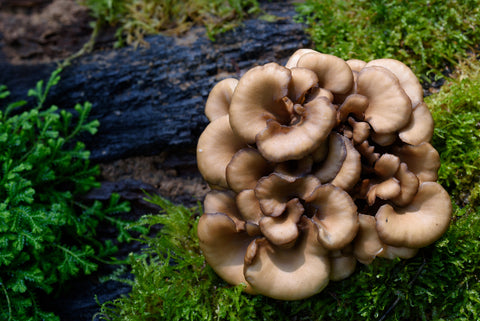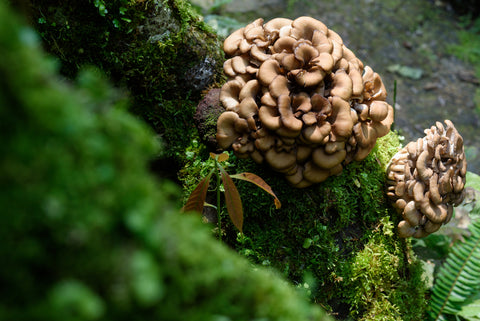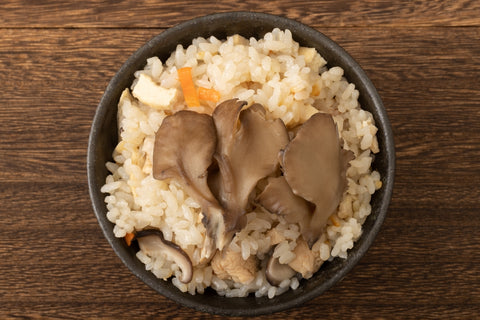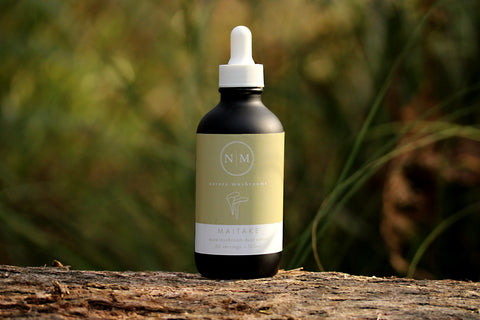What is maitake mushroom?
Maitake (pronounced may-tah-key) is a nutrient-dense, highly regarded and beneficial medicinal mushroom with a long history of use throughout China and Japan. Here, it’s believed to support immunity, balance blood sugar, boost fertility and bring about youthful energy. Quite an impressive resume for one ‘shroom, if you ask us.
So, let’s look a little closer.
Historical use of maitake mushroom
Maitake is native to China, Japan and North America where it spurts out of the forest floor at the base of oak, maple and elm trees. Perhaps our favourite part of this mushroom is its name — literally translating to “dancing mushroom” after those who found it would dance with joy. We’re not immune to a maitake-inspired-boogy, either.
As for looks, maitake’s got ‘em. It’s a stunning “polypore” mushroom with a series of frilly, brown caps, many claiming it resembles a bird’s plumage (hence its popular name, “hen of the woods”).
Rumour has it, maitake was first discovered and used around 2000 years ago. However, most traditional sources fail to mention maitake. Instead, these sources refer to its close sibling “umbrella polypore” which was believed to make those who consumed it feel happy and look younger (we’ll take 10, please).
But today, with growing research and widespread use, maitake has entered the spotlight in its own way (and completely separate from its sibling). And with a long list of nutrients and health benefits, it’s easy to see why.

What is maitake mushroom good for?
Maitake is a rich source of fibre, amino acids, antioxidants and Vitamins B, C and D. But what really gives maitake its benefits is its concentration of active polysaccharides.
Say what now?
Polysaccharides are a fancy word for long-chain carbohydrates. The most common polysaccharide in maitake being beta-glucan, which has strong immunological activity.
These nutrients and bioactive components combine to give maitake an impressive array of benefits — including support for a range of conditions, like cancer, diabetes and polycystic ovary syndrome.
Buuut it’s important to note, we’re not painting maitake as a cure-all for these complex conditions. But early research suggests it may lend a helping hand alongside traditional treatment methods.
Let’s look at the studies, shall we?
Maitake for Polycystic Ovary Syndrome
Polycystic Ovary Syndrome (PCOS) is a hormonal condition that affects 8 - 13% of young women.[1]
And, it can be associated with a range of problems, including irregular menstrual cycles, excessive facial and body hair growth, acne, obesity, reduced fertility and increased risk of diabetes.
In most cases, PCOS is associated with some level of insulin resistance (maitake has the potential to address this — but more on that in a minute).
A Japanese study found maitake could be used on its own or in combination with traditional PCOS medicine. Spanning over a period of 3 months, 20 of the 26 women who received maitake polysaccharide extract ovulated. Even more interestingly, 6 of the 8 women who failed to ovulate after being treated with traditional medicine (clomiphene citrate) ovulated after receiving maitake polysaccharide extract. [2]

Maitake for diabetes
Type 2 diabetes occurs when your body can’t effectively use insulin, which results in high blood sugar levels.
Remarkably, several studies have emerged reporting significant improvement in blood sugar levels in type 2 diabetes patients after they received maitake polysaccharides.[3] There have also been several; animal studies where maitake was orally administered to diabetic mice which resulted in reduced blood sugar levels. [4] [5]
Maitake for cancer
Some researchers believe maitake has the strongest activity in tumour growth inhibition of all the commonly studied medicinal mushrooms.[6]
“Maitake D-Fraction” refers to a highly purified, bioactive extract of the beta-glucans found in maitake. And, modern research has tested the potential for MD-fraction to be administered to cancer patients (both on its own and in combination with chemotherapy) with some pretty impressive findings.
One study administered a combination of maitake polysaccharide extracts and maitake fruiting body to cancer patients aged 22 to 57 years. The results saw cancer regression or significant improvement in 58% of liver cancer patients, 68% of breast cancer patients and 62% of lung cancer patients. [7]
Finally, umbrella polypore (maitake’s close sibling which shares many similar characteristics) has been approved as an anti-cancer agent in China.
But remember, we’re still in the early stages of research. There’s a long way to go before we made any radical claims or it becomes common practice in the western world.
What does maitake mushroom taste like?
Unlike many other medicinal mushrooms (which are consumed for their function rather than flavour) maitake is a culinary delight. It boasts a deep, earthy, slightly peppery flavour, making them highly sought after for chefs and foodies alike. Try them sautéed, fried or roasted.

How to take maitake mushroom
Cooking is a fun and delicious way to get a good dose of maitake mushroom.
But if you’d like a more concentrated and convenient dosage, you can incorporate maitake supplements into your diet. These are most commonly in the form of extracts, tinctures, powders or capsules.
To learn more about the different types of extracts — and what they mean for you — check out our article: what is a mushroom extract, anyway?
Where to buy maitake mushroom
We can’t speak for raw maitake mushrooms, as availability will vary based on your location.
But if you’re interested in experimenting with maitake supplements, we can help.
At Natura Mushrooms, we source hand-cultivated maitake from the USA which is delivered directly to our mushroom farm in Gippsland, Victoria. Then, we use a range of extraction methods to draw out the benefits.
Maitake mushroom is available in:
Add maitake to your smoothie, coffee or main meal.
We recommend taking:
- ½ a teaspoon of Maitake powder daily, or
- 2 ml of Maitake liquid extract daily
Finally, we recommend consulting your doctor or health care professional before beginning with mushroom supplements. While maitake is considered well-tolerated and safe to consume, it has strong immunological activity and can impact blood sugar levels, so it’s always best to seek guidance first.
Resources:
- https://www.betterhealth.vic.gov.au/health/conditionsandtreatments/polycystic-ovarian-syndrome-pcos
- https://www.naturalmedicinejournal.com/journal/maitake-induces-ovulation-people-polycystic-ovarian-syndrome
- https://pubmed.ncbi.nlm.nih.gov/11903406/
- https://pubmed.ncbi.nlm.nih.gov/7820117/
- https://onlinelibrary.wiley.com/doi/10.1211/jpp.59.4.0013
- https://isom.ca/wp-content/uploads/2020/01/JOM_1997_12_1_07_Maitake_D-fraction_Healing_and_Preventive_Potential_for-.pdf
- https://pubmed.ncbi.nlm.nih.gov/12126464/
- https://www.amazon.com.au/Medicinal-Mushrooms-Essential-Martin-Powell-ebook/dp/B00MHQZS5W

